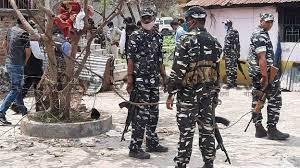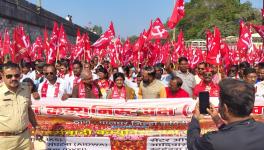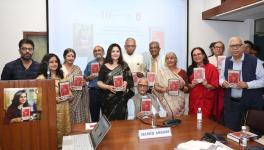Birbhum Massacre Bares Trinamool’s Structural Flaws

Image for representational purpose. Credit: TV9 Bangla
The massacre carried out at West Bengal’s Bogtui village on Monday frames much of what is wrong with the ruling party in the state, the Trinamool Congress (TMC). Principally, there is an over-reliance on local thugs to deliver the desired electoral outcomes without the leadership having any control over them.
It now appears that Bogtui village, on the outskirts of Rampurhat town in the Birbhum district, has a history of violence and criminal activity. That was all the more reason why it should have been better policed. Instead, when Sheikh Bhadu, the local TMC boss and deputy head of the Barshal gram panchayat, was shot dead, his supporters were allowed a free rein—which they used to attack the opposing faction and set fire to several houses, burning alive eight people.
Bhadu’s story itself is a cautionary tale. A daily wage worker before the TMC came to power, he had a meteoric rise, gradually assuming control of illegal sand mining, stone quarrying and the manufacture of bombs and other arms, which blights the area. It was the subsequent fuelling of factional wars in a district marked by the virtual absence of political opposition that led to the massacre.
Obviously, in the immediate term, the perpetrators of both crimes must be identified and punished, but in the medium term, the ruling party in Bengal has to fix the problem of recalcitrant local feudatories defying the law and bring under control the spiralling political violence in the state.
We can safely dismiss the puerile demands of the Bharatiya Janata Party (BJP), the country’s most violent and toxic political group, that central rule be imposed on Bengal and ignore Prime Minister Narendra Modi’s gut-churning theatrics over the incident. We all know how much sympathy he has felt or expressed for the huge army of victims of violence perpetrated by his party and other constituents of the Sangh Parivar.
At the moment, it would be more productive to look at the broader political context of Bengal rather than focussing on Bogtui. The context is framed by the by-elections in the Ballygunge Assembly constituency and the Asansol parliamentary constituency, scheduled for 12 April. From the point of view of actual and immediate impact, neither by-election is crucial, but both are important symbolically and from a longer-term perspective.
The Trinamool Congress has nominated Babul Supriyo, the former BJP Member of Parliament from Asansol who jumped ship soon after the Assembly election in Bengal last year, to contest from the Ballygunge seat. The most credible challenger is the Left Front candidate, Saira Shah Halim. In Asansol, the TMC has nominated Shatrughan Sinha, formerly of the BJP and Congress. He will be up against the BJP’s Agnimitra Paul, currently the BJP legislator from Asansol South, and the Left Front’s Partha Mukherjee.
The Ballygunge result will not change anything in the constituency given the TMC’s monster majority, but it is a prestigious constituency on account of having been represented by TMC’s Subrata Mukherjee, a towering political figure, until his death in November last year. The TMC cannot countenance losing it. The constituency was with the Congress from 1971 to 1977. From 1977 to 2006, it was held by the CPI(M). Since then, it has been with the TMC. Javed Ahmed Khan won here in 2006, after which Mukherjee returned to Ballygunge in 2011, 2016 and 2021.
Though the TMC swept South Bengal in last year’s Assembly election, winning all the seats in Kolkata, Ballygunge may prove tricky because the party has picked a candidate with a dubious record as far as secular politics is concerned. Supriyo is widely believed to have had a role in the communal riots that broke out in Asansol in 2018, and prominent Muslim clerics have already said they will not back him. Apart from the fact that there is a substantial Muslim population in the Ballygunge constituency, it is not unlikely that a lot of people who are against the BJP’s brand of divisive politics will be uncomfortable voting for him.
At bottom, however, is another point: That Bengal Chief Minister Mamata Banerjee has undermined her claim to be a champion of secular politics and minority rights by admitting Supriyo into her party and further by nominating him for Ballygunge. Halim, thus, will not be an outsider.
The Asansol contest may, however, prove more important from another point of view. In 2014, the BJP had won only two Lok Sabha seats from Bengal—Darjeeling, which they held, and Asansol, which Supriyo wrested for the party. In 2019, when the BJP won 18 seats, Asansol was among them. In that sense, Asansol could be an indicator of the BJP’s fortunes in South Bengal. If the TMC wins, it could mean more pain for the BJP in Bengal.
As it happens, the BJP is already on the ropes in the state, despite its massive investment in the 2021 Assembly election, both in finances and human resources. Modi and Union Home Minister Amit Shah had staked their reputations in a losing cause. The aftermath hasn’t been pretty for the party.
Huge mandates for any party anywhere are unhealthy. In Bengal and the country, credible opposition is vital. Unfortunately, the BJP is incapable of providing healthy opposition, apart from being divisive and clueless about governance when in power. Under Modi, especially, the party’s default response to losing an election is to either begin poaching legislators of other parties to unseat elected governments, or, where that is not possible, to foment communal troubles to embarrass existing dispensations.
That is why many people in Bengal are looking forward to the revival of the Left. There are indications from the elections to urban local bodies at the end of last year and this year that the Left is poised to recapture the position of the main opposition party in the state.
The recasting of the Bengal CPI(M) hierarchy at its 26th state conference in the middle of March, with the induction of fresh faces into the state committee, was encouraging. With former MP Mohammed Salim replacing Suryakanta Mishra as the state secretary, more dynamism is expected in the party. Reports suggest there is new optimism among the party workers.
It will still be a long haul, but a win in Ballygunge could well lead to a reconfiguration of the political field in Bengal. At the same time, the BJP can write itself off for the time being if it loses the Asansol contest.
The author is an independent journalist and researcher. The views are personal.
Get the latest reports & analysis with people's perspective on Protests, movements & deep analytical videos, discussions of the current affairs in your Telegram app. Subscribe to NewsClick's Telegram channel & get Real-Time updates on stories, as they get published on our website.























